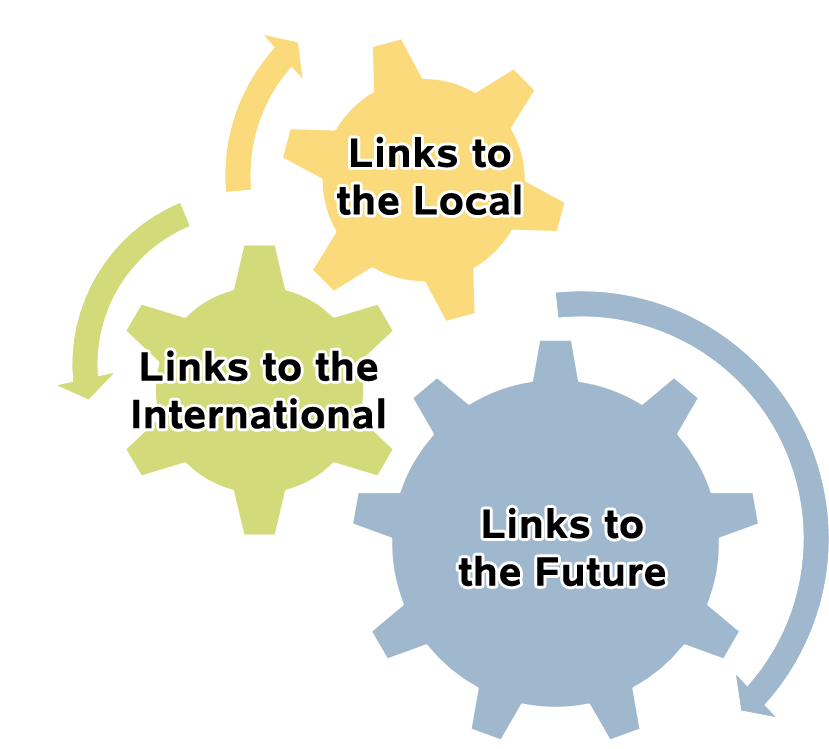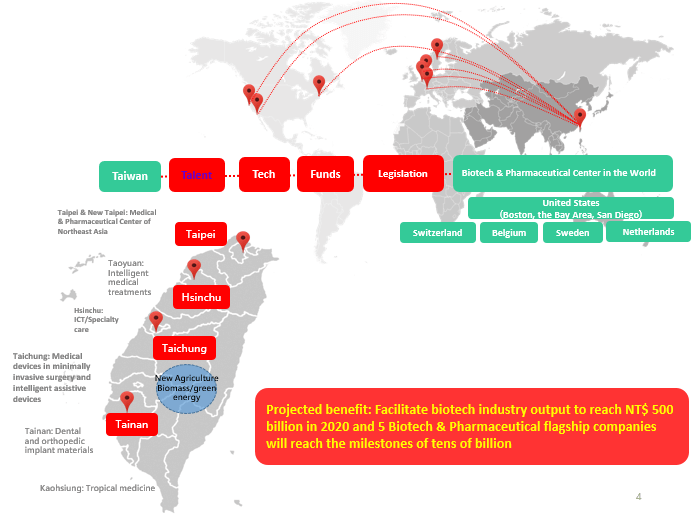
-
About Us
-
Why Taiwan
-
Business in Taiwan
-
Resources
 To provide a new engine for economic growth, the government has prioritized five industries that combine strong domestic demand with local characteristics: Internet of Things (IoT) in an Asian Silicon Valley, smart machinery, biotechnology and pharmaceuticals, green energy technology and national defense. Initially, local markets will drive demand. Investment, technology and talent will congregate to form innovative industrial clusters that spur global expansion and cultivate international enterprises. At the same time, the clusters will raise technical standards, balance regional development and create new job opportunities.
To provide a new engine for economic growth, the government has prioritized five industries that combine strong domestic demand with local characteristics: Internet of Things (IoT) in an Asian Silicon Valley, smart machinery, biotechnology and pharmaceuticals, green energy technology and national defense. Initially, local markets will drive demand. Investment, technology and talent will congregate to form innovative industrial clusters that spur global expansion and cultivate international enterprises. At the same time, the clusters will raise technical standards, balance regional development and create new job opportunities.
Central to the Asian Silicon Valley Plan are forward-looking “future industries” such as IoT, Big Data and Industry 4.0. By strengthening local industries while looking internationally, the plan will combine the copious manufacturing and R&D capacity of domestic manufacturers with R&D resources of advanced nations. Taiwan's supply chains will become world-class and highly innovative.
The plan will congregate technology, talent and venture capital from around the world to build a sustainable R&D environment capable of developing innovative, intelligent applications. Its economic strategies will promote innovation, employment and distribution while responding to cross-generation, cross-border, cross-field, and cross-channel (physical and virtual) development trends. As the plan becomes the engine behind Taiwan's next generation of industrial growth, its visions of a smart Taiwan with high-value services and of a nuclear-free homeland that implements the Paris Summit carbon reduction goals will become reality.
The Greater Tainan area's upgrade to a special municipality together with the central government's decision to designate green energy as one of the nation's six emerging industries has led Tainan to prioritize establishment of a low carbon, sustainable technological city, implementing plans for a solar city, smart low-carbon city, Biotechnology Green Energy Expo, and electric vehicle demonstration. Conditions in Tainan are well suited to development of green energy, and a strong foundation is already in place. With a focus on photovoltaics and LEDs, other related industries include electric vehicles, wind power, hydrogen energy and fuel cells, and energy ICT. Related enterprises are clustered in the Southern Tainan Science Park, Tainan Technology Industrial Park, Tree Valley Park, YongKang Industrial Park and Rende Industrial Park. Included in the central government's proposed five major innovative R&D industries is a plan to transform the Tainan area of Shalun into a green energy technology and innovation ecosystem. By integrating basic academic research with applications developed by research institutions, businesses will be better equipped to develop and promote products and technologies. International investment promotion will attract the talent and technology needed to enhance the development of local industry and services in southern Taiwan. Better linkage with the rest of the world will spur overall industrial development.
Taiwan's biomedical industry is world renowned, in particular its clinical medicine and research into diseases that are highly prevalent among people of Chinese ethnicity. Researchers benefit from abundant biomedical R&D facilities, including more than 100 hospitals that are equipped to participate in clinical trials and 23 hospitals that are internationally certified clinical trial research centers. Besides Taiwan's possession of an excellent health system, abundant professional health workers and comprehensive health facilities, the costs associated with R&D of new drugs are lower than those in Singapore, Japan or Australia. Taiwan also respects and protects intellectual property rights. With so many advantages, conditions are ripe for consolidating local innovation clusters and linking them to the global biotechnology and pharmaceutical industry. By improving the effectiveness of people, capital, intellectual property and the legal environment while integrating resources and carefully choosing R&D themes, Taiwan is in position to build an Asia-Pacific center for biomedical R&D.
The Taiwan Biobank was built following the example of other nations with advanced biotechnology and pharmaceutical industries. By specializing in the genes, lifestyle habits, and geographical and environmental factors common among eastern groups of people, the biobank is well positioned to serve as a test market and trial base for the Asia-Pacific biotechnology and pharmaceutical industry. In the future, Taiwan will utilize its industrial advantages and resources, connect clusters, and integrate production and demand to form a comprehensive, seamless industrial clusters. Future clusters in Taipei's Nangang District, Hsinchu's Zhubei City, Taichung's Central Taiwan Science Park and Tainan's Southern Taiwan Science Park will be part of a one-day living circle along the high-speed rail line. Together, they will form a biotechnology and pharmaceutical R&D belt.

Upgrading of the precision machinery industry is fostering the development of smart machinery, one of Taiwan's five major innovative R&D industries. It is creating new job opportunities and expanding opportunities for whole-factory and whole-productionline exports, and in the process of turning central Taiwan into a center for smart machinery. Implementation of the Smart Machinery Industry Promotion Project is consolidating Taiwan's abundant capacity for innovation, so it can develop technological applications and services that satisfy demand and create the next growth engine for Taiwan's machinery industry.
The project is consolidating smart technology to give machinery the ability to predict malfunctions, improve precision and make automatic adjustments to settings based on data readings. As it gives Taiwan's machinery and equipment manufacturers the capacity to provide complete solutions, it is encouraging industries to accelerate their pace of smart machinery adoption. Businesses that build smart production lines can then use the cloud and the internet to quickly connect with consumers and form manufacturing network service systems. Future development goals include the following:

Policy guidance calls for reforming national defense and promoting the integration of the private sector in the defense industry so as to build an autonomous defense industry. Taiwan will privatize defense resources in order to boost the aerospace, navy shipbuilding and information security industries, as well as peripheral mechanical, materials and machinery industries. The National Chung-Shan Institute of Science and Technology in Taichung, Tainan and Taoyuan will become bases for the development of unmanned aerial vehicles and indigenous advanced trainers, which will spur development of the next generation of fighters. Kaohsiung, Pingtung and Yilan will become bases for the development and manufacture of newly configured submarines and updated or upgraded mid-to-largesize surface ships. Taipei and Hsinchu will become bases for using military demand to increase the scale of the domestic information security market, aiding both investment and R&D.
R&D in materials is carried out mainly to speed up the development of high-value chemical materials needed by the five major innovative R&D industries. Typically, pilot mass production plans facilitate private-sector production of higher-value chemical materials that are innovative and green.
A circular economy aims to achieve the effective use of resources by circulating them for reuse. Manufacturers that stop polluting produce both environmental and economic benefits. The integration and linking of energy and resources provides a diverse range of sustainable-use options.
Three main themes are behind Taiwan's push to accelerate recalibration of the agriculture industry: creating model agricultural businesses, building agricultural safety systems and raising agricultural marketing capacity. Pilot policies include targeted environmental payments, agricultural insurance, solar sharing and young farmer support. The government continues to bolster agricultural safety systems as well as market-oriented sales, vigorous small farms and support for agribusiness. A national-level farm product trading platform and a national agriculture and fisheries company are being established. New markets are being opened in Southeast Asia and Muslim countries in the Middle East. These changes are bringing new innovation and value to agriculture in Taiwan and are restructuring its agriculture.